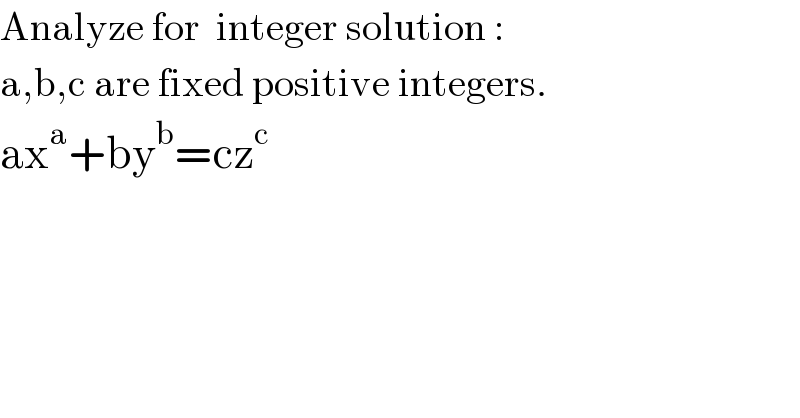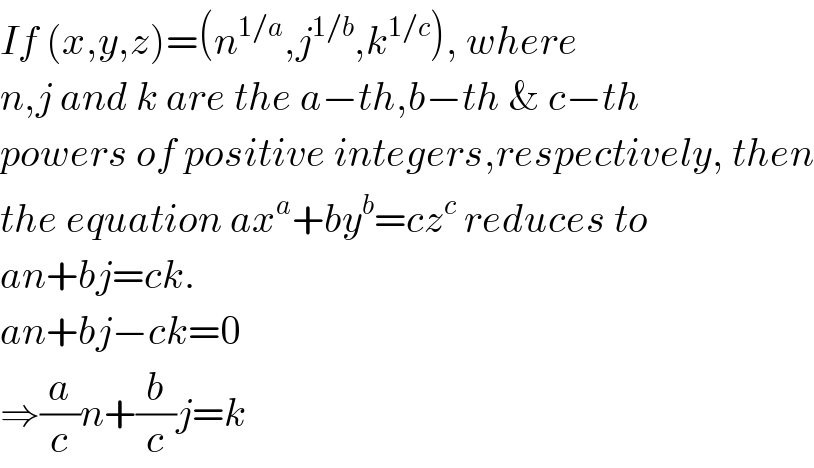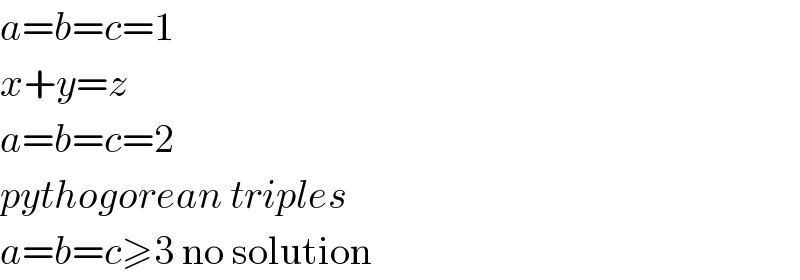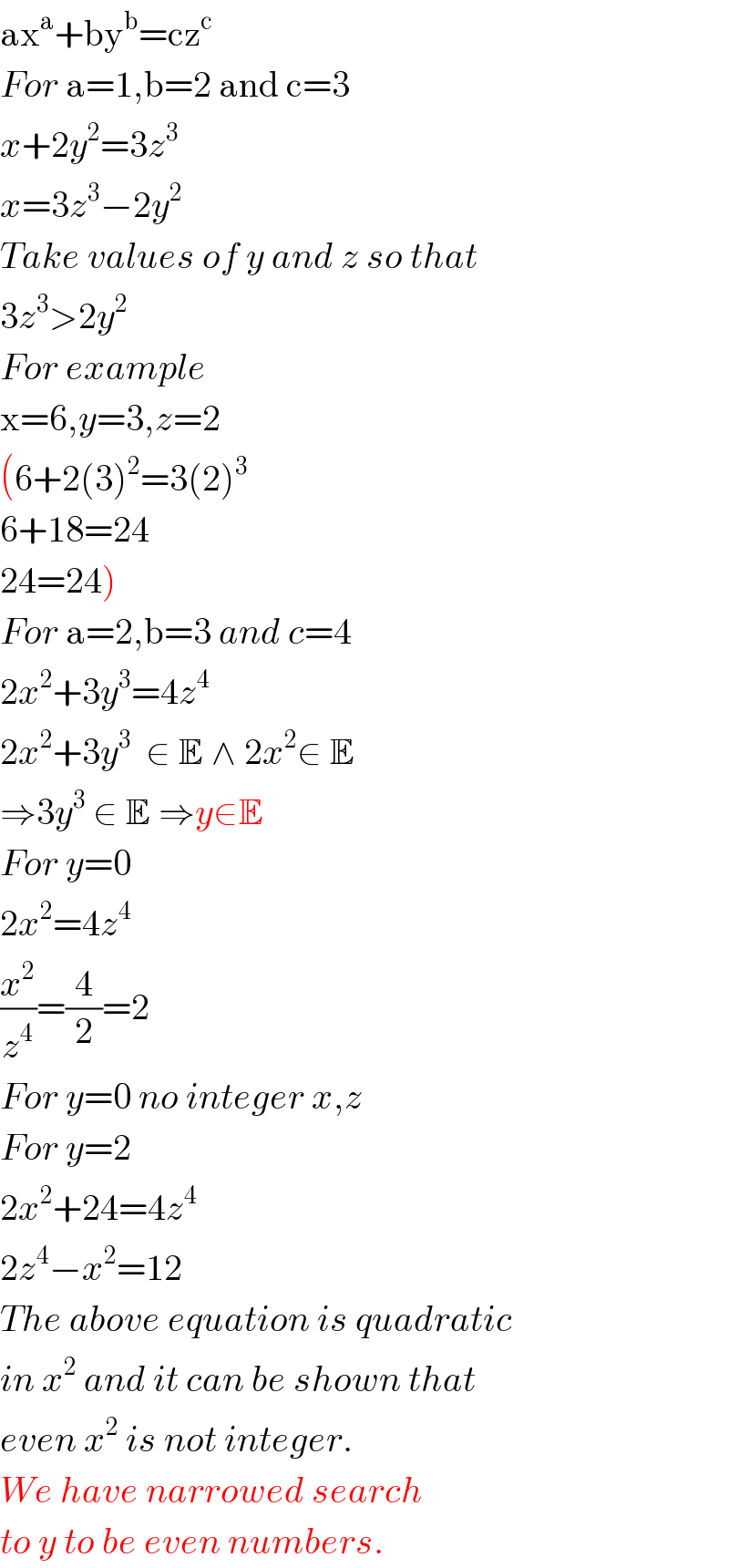
Question Number 4266 by Rasheed Soomro last updated on 06/Jan/16

$$\mathrm{Analyze}\:\mathrm{for}\:\:\mathrm{integer}\:\mathrm{solution}\:: \\ $$$$\mathrm{a},\mathrm{b},\mathrm{c}\:\mathrm{are}\:\mathrm{fixed}\:\mathrm{positive}\:\mathrm{integers}. \\ $$$$\mathrm{ax}^{\mathrm{a}} +\mathrm{by}^{\mathrm{b}} =\mathrm{cz}^{\mathrm{c}} \\ $$
Commented by Yozzii last updated on 06/Jan/16

$${If}\:\left({x},{y},{z}\right)=\left({n}^{\mathrm{1}/{a}} ,{j}^{\mathrm{1}/{b}} ,{k}^{\mathrm{1}/{c}} \right),\:{where} \\ $$$${n},{j}\:{and}\:{k}\:{are}\:{the}\:{a}−{th},{b}−{th}\:\&\:{c}−{th} \\ $$$${powers}\:{of}\:{positive}\:{integers},{respectively},\:{then} \\ $$$${the}\:{equation}\:{ax}^{{a}} +{by}^{{b}} ={cz}^{{c}} \:{reduces}\:{to}\:\: \\ $$$${an}+{bj}={ck}. \\ $$$${an}+{bj}−{ck}=\mathrm{0}\: \\ $$$$\Rightarrow\frac{{a}}{{c}}{n}+\frac{{b}}{{c}}{j}={k} \\ $$
Commented by prakash jain last updated on 06/Jan/16

$${a}={b}={c}=\mathrm{1} \\ $$$${x}+{y}={z} \\ $$$${a}={b}={c}=\mathrm{2} \\ $$$${pythogorean}\:{triples} \\ $$$${a}={b}={c}\geqslant\mathrm{3}\:\mathrm{no}\:\mathrm{solution} \\ $$
Commented by Rasheed Soomro last updated on 13/Jan/16

$$\mathrm{ax}^{\mathrm{a}} +\mathrm{by}^{\mathrm{b}} =\mathrm{cz}^{\mathrm{c}} \\ $$$${For}\:\mathrm{a}=\mathrm{1},\mathrm{b}=\mathrm{2}\:\mathrm{and}\:\mathrm{c}=\mathrm{3} \\ $$$${x}+\mathrm{2}{y}^{\mathrm{2}} =\mathrm{3}{z}^{\mathrm{3}} \\ $$$${x}=\mathrm{3}{z}^{\mathrm{3}} −\mathrm{2}{y}^{\mathrm{2}} \\ $$$${Take}\:{values}\:{of}\:{y}\:{and}\:{z}\:{so}\:{that} \\ $$$$\mathrm{3}{z}^{\mathrm{3}} >\mathrm{2}{y}^{\mathrm{2}} \\ $$$${For}\:{example} \\ $$$$\mathrm{x}=\mathrm{6},{y}=\mathrm{3},{z}=\mathrm{2} \\ $$$$\left(\mathrm{6}+\mathrm{2}\left(\mathrm{3}\right)^{\mathrm{2}} =\mathrm{3}\left(\mathrm{2}\right)^{\mathrm{3}} \right. \\ $$$$\mathrm{6}+\mathrm{18}=\mathrm{24} \\ $$$$\left.\mathrm{24}=\mathrm{24}\right) \\ $$$${For}\:\mathrm{a}=\mathrm{2},\mathrm{b}=\mathrm{3}\:{and}\:{c}=\mathrm{4} \\ $$$$\mathrm{2}{x}^{\mathrm{2}} +\mathrm{3}{y}^{\mathrm{3}} =\mathrm{4}{z}^{\mathrm{4}} \\ $$$$\mathrm{2}{x}^{\mathrm{2}} +\mathrm{3}{y}^{\mathrm{3}} \:\:\in\:\mathbb{E}\:\wedge\:\mathrm{2}{x}^{\mathrm{2}} \in\:\mathbb{E} \\ $$$$\Rightarrow\mathrm{3}{y}^{\mathrm{3}} \:\in\:\mathbb{E}\:\Rightarrow{y}\in\mathbb{E} \\ $$$${For}\:{y}=\mathrm{0} \\ $$$$\mathrm{2}{x}^{\mathrm{2}} =\mathrm{4}{z}^{\mathrm{4}} \\ $$$$\frac{{x}^{\mathrm{2}} }{{z}^{\mathrm{4}} }=\frac{\mathrm{4}}{\mathrm{2}}=\mathrm{2} \\ $$$${For}\:{y}=\mathrm{0}\:{no}\:{integer}\:{x},{z} \\ $$$${For}\:{y}=\mathrm{2} \\ $$$$\mathrm{2}{x}^{\mathrm{2}} +\mathrm{24}=\mathrm{4}{z}^{\mathrm{4}} \\ $$$$\mathrm{2}{z}^{\mathrm{4}} −{x}^{\mathrm{2}} =\mathrm{12} \\ $$$${The}\:{above}\:{equation}\:{is}\:{quadratic}\: \\ $$$${in}\:{x}^{\mathrm{2}} \:{and}\:{it}\:{can}\:{be}\:{shown}\:{that} \\ $$$${even}\:{x}^{\mathrm{2}} \:{is}\:{not}\:{integer}. \\ $$$${We}\:{have}\:{narrowed}\:{search} \\ $$$${to}\:{y}\:{to}\:{be}\:{even}\:{numbers}. \\ $$
Answered by Rasheed Soomro last updated on 11/Jan/16

$$\mathrm{ax}^{\mathrm{a}} +\mathrm{by}^{\mathrm{b}} =\mathrm{cz}^{\mathrm{c}} \\ $$$${Let}\:\mathrm{a}=\mathrm{4j}^{\mathrm{2}} \:,\:\mathrm{b}=\mathrm{4k}^{\mathrm{2}} \:,\:\mathrm{c}=\mathrm{4}{l}^{\mathrm{2}} \\ $$$$\mathrm{4j}^{\mathrm{2}} \mathrm{x}^{\mathrm{4j}^{\mathrm{2}} } +\mathrm{4k}^{\mathrm{2}} \mathrm{y}^{\mathrm{4k}^{\mathrm{2}} } =\mathrm{4}{l}^{\mathrm{2}} \mathrm{z}^{\mathrm{4}{l}^{\mathrm{2}} } \\ $$$$\mathrm{j}^{\mathrm{2}} \mathrm{x}^{\mathrm{4j}^{\mathrm{2}} } +\mathrm{k}^{\mathrm{2}} \mathrm{y}^{\mathrm{4k}^{\mathrm{2}} } ={l}^{\mathrm{2}} \mathrm{z}^{\mathrm{4}{l}^{\mathrm{2}} } \\ $$$$\left(\mathrm{jx}^{\mathrm{2j}^{\mathrm{2}} } \right)^{\mathrm{2}} +\left(\mathrm{ky}^{\mathrm{2k}^{\mathrm{2}} } \right)^{\mathrm{2}} =\left({l}\mathrm{z}^{\mathrm{2}{l}^{\mathrm{2}} } \right)^{\mathrm{2}} \\ $$$$\left(\mathrm{jx}^{\mathrm{2j}^{\mathrm{2}} } ,\mathrm{ky}^{\mathrm{2k}^{\mathrm{2}} } ,{l}\mathrm{z}^{\mathrm{2}{l}^{\mathrm{2}} } \right)\:{is}\:{Pythagorean}\:{triple}. \\ $$$$−−−−−−−−−−− \\ $$$$\mathrm{If}\:\left(\mathrm{X},\mathrm{Y},\mathrm{Z}\right)\:{is}\:{Pythagorean}\:{triplet} \\ $$$${such}\:{that}\:\mathrm{j}\mid\mathrm{X}\:,\mathrm{k}\mid\mathrm{Y}\:{and}\:{l}\mid\mathrm{Z} \\ $$$$\left(\frac{\mathrm{1}}{\mathrm{j}}\:\mathrm{X}^{\:\frac{\mathrm{1}}{\mathrm{2j}^{\mathrm{2}} }} \:,\:\frac{\mathrm{1}}{{k}}\mathrm{Y}^{\:\frac{\mathrm{1}}{\mathrm{2}{k}^{\mathrm{2}} }} \:,\:\frac{\mathrm{1}}{{l}}\mathrm{Z}^{\:\frac{\mathrm{1}}{\mathrm{2}{l}^{\mathrm{2}} }} \:\right)\:{is}\:{triplet} \\ $$$${satisfying}\:\:\mathrm{ax}^{\mathrm{a}} +\mathrm{by}^{\mathrm{b}} =\mathrm{cz}^{\mathrm{c}} \:{where} \\ $$$${j}=\frac{\sqrt{\mathrm{a}}}{\mathrm{2}}\:,{k}=\frac{\sqrt{\mathrm{b}}}{\mathrm{2}}\:,{l}=\frac{\sqrt{\mathrm{c}}}{\mathrm{2}} \\ $$$$\mathrm{a},\mathrm{b},\mathrm{c}\:\mathrm{perfect}\:\mathrm{squares}\:\mathrm{and}\:\mathrm{even} \\ $$$$−−−−−−−−\mathcal{OR}−−−−−−− \\ $$$$\mathrm{If}\:\left(\mathrm{X},\mathrm{Y},\mathrm{Z}\right)\:{is}\:{Pythagorean}\:{triplet} \\ $$$${such}\:{that}\:\frac{\sqrt{\mathrm{a}}}{\mathrm{2}}\:\mid\:\mathrm{X}\:,\frac{\sqrt{\mathrm{b}}}{\mathrm{2}}\:\mid\:\mathrm{Y}\:\mathrm{and}\:\frac{\sqrt{\mathrm{c}}}{\mathrm{2}}\:\mid{Z} \\ $$$$\mathrm{Also}\:\:\mathrm{X}^{\frac{\mathrm{1}}{\mathrm{a}}} \:,\mathrm{Y}^{\frac{\mathrm{1}}{\mathrm{b}}} ,\mathrm{Z}^{\frac{\mathrm{1}}{\mathrm{c}}} \:\mathrm{are}\:\mathrm{integers}. \\ $$$$\:\left(\frac{\mathrm{2}}{\sqrt{\mathrm{a}}}\:\mathrm{X}^{\frac{\mathrm{2}}{\mathrm{a}}} ,\:\frac{\mathrm{2}}{\sqrt{\mathrm{b}}}\:\mathrm{Y}^{\frac{\mathrm{2}}{\mathrm{b}}} ,\frac{\mathrm{2}}{\sqrt{\mathrm{c}}}\:\mathrm{Z}^{\frac{\mathrm{2}}{\mathrm{c}}} \right)\:\mathrm{is}\:\mathrm{a}\:\mathrm{required}\:\mathrm{triple}\:. \\ $$$$\mathrm{a},\mathrm{b},\mathrm{c}\:\mathrm{are}\:\mathrm{perfect}\:\mathrm{squares}\:\mathrm{and}\:\mathrm{even}. \\ $$$$\mathrm{j}=\mathrm{1},\mathrm{k}=\mathrm{2},{l}=\mathrm{3} \\ $$$$\left(\mathrm{x}^{\mathrm{2}} \right)^{\mathrm{2}} +\left(\mathrm{2y}^{\mathrm{8}} \right)^{\mathrm{2}} =\left(\mathrm{3z}^{\mathrm{18}} \right)^{\mathrm{2}} \\ $$$$\mathrm{x}^{\mathrm{4}} +\mathrm{4y}^{\mathrm{16}} =\mathrm{9z}^{\mathrm{36}} \\ $$$$−−−−−− \\ $$$$\left({m}^{\mathrm{2}} −{n}^{\mathrm{2}} ,\mathrm{2}{mn},{m}^{\mathrm{2}} +{n}^{\mathrm{2}} \right)\:{is}\:{general} \\ $$$${triple},{suggested}\:{by}\:\mathcal{E}{uclid} \\ $$$$\forall\:{m},{n}\in\mathbb{N}\:\wedge\:{m}>{n} \\ $$$$−−−−−−−−−− \\ $$$$\mathrm{For}\:\mathrm{2mn}\:\mathrm{to}\:\mathrm{be}\:\mathrm{of}\:\mathrm{bx}^{\mathrm{b}} \:\mathrm{type} \\ $$$$\mathrm{let}\:\mathrm{m}=\frac{\mathrm{b}}{\mathrm{2}}\mathrm{n}^{\mathrm{b}−\mathrm{1}} \\ $$$$\mathrm{2mn}=\mathrm{bn}^{\mathrm{b}} \\ $$$$\mathrm{m}^{\mathrm{2}} +\mathrm{n}^{\mathrm{2}} =\left(\mathrm{bn}^{\mathrm{b}} \right)^{\mathrm{2}} +\mathrm{n}^{\mathrm{2}} =\mathrm{b}^{\mathrm{2}} \mathrm{n}^{\mathrm{2b}} +\mathrm{n}^{\mathrm{2}} \\ $$$$\:\:\:\:\:\:\:\:\:\:\:\:=\left(\mathrm{b}^{\mathrm{2}} \mathrm{n}^{\mathrm{2b}−\mathrm{2}} +\mathrm{1}\right)\mathrm{n}^{\mathrm{2}} =\mathrm{cn}^{\mathrm{c}} \\ $$$$\:\:\:\:\:\:\:\:\:\:\:\:\:\:\:\left(\mathrm{b}^{\mathrm{2}} \mathrm{n}^{\mathrm{2b}−\mathrm{2}} +\mathrm{1}\right)=\mathrm{cn}^{\mathrm{c}−\mathrm{2}} \\ $$$$ \\ $$$$\mathrm{Continue} \\ $$$$ \\ $$
